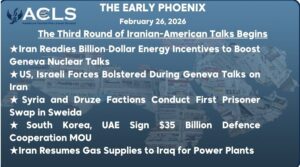Israel Reveals Plan to Evacuate Civilans Ahead of Rafah Operation
TOP HEADLINES:
- Netanyahu Greenlights IDF Plan to Evacuate Civilians from Rafah
- U.S. Circulates Draft UN Resolution for Immediate Ceasefire and Hostage Release
- White House Warns of Potential Iranian Cyberattacks on US Water Systems
- Yemeni Government Seeks UN Help to Prevent Environmental Disaster from “Rubymar” Sinking
- PKK Says it Has Acquired Air Defense System and Downed 15 Turkish Drones
=======================
★ ISRAEL & PALESTINIAN TERRITORIES
-
Netanyahu Greenlights IDF Plan to Evacuate Civilians from Rafah
Ahead of U.S. Secretary of State Antony Blinken’s visit to the Middle East, Israeli Prime Minister Benjamin Netanyahu said he has approved an IDF plan to evacuate Palestinian civilians from “battle zones” in Rafah, thereby clearing the way for an IDF operation against Hamas remnants in the Rafah area. The U.S. has expressed concern over potential humanitarian consequences of a Rafah operation and has pressed Israel to adopt targeted actions against Hamas without affecting civilians. An Israeli delegation is set to discuss military strategies in Washington next week.
-
Report: Israel Developing Secret Plan for Gaza Aid Distribution Excluding Hamas
Arabic media amplified a Wall Street Journal report that Israeli officials are crafting a “secret” strategy to manage aid distribution in Gaza, potentially setting the stage for Palestinian-led governance post-conflict. This initiative, aimed at filling the governance vacuum left by the war, involves regional discussions for non-Hamas Palestinian involvement in aid logistics. The plan, facing opposition from Hamas and internal Israeli cabinet divisions, seeks to ensure aid delivery and establish a governance framework supported by Arab-funded security forces. Despite challenges and Hamas’s threats against cooperation, the proposal represents an early step toward addressing the humanitarian crisis and future governance in Gaza.
-
Blinken Says U.S. is Circulating Draft UN Resolution for Immediate Ceasefire and Hostage Release in Gaza
The United States has introduced a draft resolution to the UN Security Council, advocating for an immediate ceasefire in Gaza, contingent upon the release of hostages. Secretary of State Antony Blinken emphasized the resolution’s importance during his visit to Saudi Arabia, highlighting its potential to send a strong international message. This proposal marks a significant shift for the U.S., as Washington had previously vetoed similar resolutions.
-
Hamdan Says Israel Rejected Hamas’s Ceasefire Proposal
Hamas senior official Osama Hamdan reported that intermediaries from Egypt and Qatar relayed Israel’s negative overall response to their comprehensive ceasefire proposal, which emphasizes principles Hamas deems essential. At a press conference in Beirut, Hamdan criticized Israel for not meeting the demands of the Palestinian people and resistance, and for retreating from previous agreements, thereby stalling and potentially deadlocking negotiations. He held Israeli Prime Minister Benjamin Netanyahu and his government accountable for obstructing peace efforts and emphasized the necessity of opening Gaza’s crossings and allowing aid, particularly to northern Gaza, condemning Israel’s targeting of aid convoys and their protection teams.
-
UK Says it Will Restrict Arms Sales to Israel Unless Palestinian Prison Visits are Allowed
Britain has demanded that Israel allow Red Cross or diplomatic visits to the detained terrorists of Hamas elite Nukhba force, as part of the conditions for continuing arms supplies to Israel. British Foreign Secretary David Cameron also warned Israeli officials that Europe might impose a weapons embargo on Israel if the current situation persists. The threat comes on the heels of Canada’s decision to impose an arms embargo on Israel over its alleged violations of international law in its war against Hamas in the Gaza Strip. Israeli officials reportedly believe Washington is nudging Western allies to pressure Jerusalem as Biden administration faces electoral headwinds for support of Gaza campaign.
=======================
★ IRAN
-
White House Warns of Potential Iranian Cyberattacks on US Water Systems
The Biden administration has issued a warning to state governors about potential Iranian cyberattacks targeting US water infrastructure. National Security Adviser Jake Sullivan and EPA Administrator Michael Regan stressed the importance of securing water systems against such threats, noting the increasing aggression of Iran’s cyber capabilities. The alert underscores the serious nature of the threat to critical infrastructure, urging states to bolster cybersecurity measures.
-
US Sanctions Iran-Linked Shipping Firm and Arms Procurement Networks
In a move to disrupt attacks on Red Sea shipping and cut off funding for terrorism, the US has sanctioned Vishnu Inc, a Marshall Islands-registered company accused of shipping Iranian commodities to China and supporting IRGC and Houthi financiers. The US also announced sanctions against three networks based in Iran, Turkey, Oman, and Germany that have procured materials like carbon fiber and epoxy resins for Iran’s ballistic missile and defense equipment production.
-
Iranian Labor Union Forecasts Severe 67% Inflation in the Next Year
Hassan Sadeghi, head of the Union of Veteran Workers, forecasts a 67% inflation rate for Iran in the next year, starting March 20, highlighting the potential for increased protests due to stagnant wages amid rising living costs. He criticized the Iranian government’s tax-based budgeting and the inappropriate application of IMF policies for Iran’s unique economic situation, emphasizing the disparity between earnings in rials and expenses in dollars.
=======================
★ LEBANON
-
IDF Says Hizballah is Drawing Lebanon into Dangerous Escalation
IDF spokesperson Daniel Hagari expressed concerns over Hezbollah leading Lebanon towards a severe escalation, but the windows is still open for a diplomatic solution to the border crisis. Meanwhile, the IDF confirmed 17 Israeli soldiers and civilians have died in Hizballah-initiatied attacks in northern Israel since October 8, 2023. The IDF statement coincided with new proposals by UN diplomats on Tuesday to expand the buffer zone in southern Lebanon that is currently monitored by UNIFIL.
-
Hezbollah Deploys Armed Troops in Beirut, Raising Alarms
Arab media report significant Hizballah activity within Beirut’s Dahieh district, with an unusually large armed Hizballah contingent deploying into the area. Hizballah has been intensifying its military activity during its monthslong confrontation with Israel on Lebanon’s southern border. The IDF recently accused Hizballah of using ambulances for transporting militants and materials, further exposing the organization’s integration of military activities within civilian contexts.
=======================
★ YEMEN
-
Red Sea Security Incidents Surge by 475% Following Houthi Attacks
British data reveals a 475% increase in maritime security incidents in the Red Sea and Gulf of Aden since the onset of Houthi attacks from Yemen. This escalation, described as unprecedented, has significantly disrupted shipping routes and fuel consumption, with vessels now navigating longer distances to avoid conflict zones, leading to a notable rise in operational costs and adjustments in global trade flows.
-
Government of Yemen Seeks UN Help to Prevent Environmental Disaster from “Rubymar” Sinking
The sinking of the British ship “Rubymar” by a Houthi missile attack in the Red Sea has not yet led to significant on the Yemeni coast but has raised concerns over a potential environmental disaster. The internationally recognized Yemen government has requested UN assistance and funding for a rescue plan to mitigate enviromental impact, especially for local fishermen. The International Maritime Organization halted efforts to limit damage due to security risks from Houthi attacks. Despite rough seas hindering access, satellite imagery showed a large oil slick, though no coastal pollution has been recorded yet. Yemen’s government is calling for urgent financial, technical, and logistical support to handle the sunken ship’s cargo of fertilizers and fuel.
=======================
★ IRAQ
-
Iran-Backed Iraqi Militants Claim Drone Attack on Tel Aviv Power Station
The Islamic Resistance in Iraq, the label Iranian-backed Iraqi militants apply to themselves, announced an early Thursday drone attack on a power generation station in Tel Aviv, marking a continuation of their operations against Israeli targets. This follows previous Iraqi militant attacks on Ben Gurion Airport and an Israeli airbase. The Iraqi militants say their attacks will continue until Israel halts its Gaza operations.
-
UN’s Role in Iraq Questioned Following Corruption Scandal and UNITAD’s Early Termination
The United Nations faces scrutiny over its effectiveness in Iraq after a corruption scandal within its Iraq Assistance Mission (UNAMI) and the premature conclusion of its Investigative Team to Promote Accountability for Crimes by Daesh (UNITAD). Critics argue that the UN’s slow and limited results do not justify the extensive resources allocated. The UNITAD mission also suffered from the failure of the Iraqi parliament to pass legislation enabling the Iraqi government to use UNITAD evidence in the Iraqi judicial system, which resulted in most of UNITAD’s evidence being used in cases outside of Iraq.
-
Iran-Backed Iraqi Militant Factions Meet in Tehran to Coordinate Strategy
Prominent Iraqi militant factions announced on Tuesday they had held a meeting in Tehran to coordinate strategy among themselves and to align their activities with those of the Iranian regime. The public announcement and the meeting itself were unprecedented moves, linking the Iraqi factions’ actions to broader regional tensions, especially in Gaza and southern Lebanon, and underscored Iran’s influential role in shaping resistance strategies against American and Israeli interests.
-
Iraq Signs Deal with Siemens to Convert Flared Gas into Electricity Fuel
Iraq has entered into an agreement with Siemens Energy to transform flared gas from oil production into electricity. The operation could produce 240 million standard cubic feet of gas annually. This initiative is part of a broader Iraqi effort to harness wasted gas, aligning with environmental commitments and enhancing energy sustainability. Despite its large gas assets, Iraq has been flaring gas from its oil wells for decades rather than using the gas to power the Iraqi electrical grid, and has instead relied on large-scale imports of Iranian electricity to power the grid.
=======================
★ GULF REGION
-
Blinken Discusses Discusses Gaza Crisis with Saudi Crown Prince; Kingdom Pledges $40 Million for UNRWA
U.S. Secretary of State Antony Blinken met with Saudi Crown Prince Mohammed bin Salman on Wednesday to discuss the urgent need for civilian protection and humanitarian assistance in the ongoing Gaza conflict. The meeting is part of Blinken’s regional tour which will include Egypt and Israel, as the U.S. hopes to to expedite efforts towards a ceasefire after nearly six months of warfare. Meanwhile, the King Salman Humanitarian Aid and Relief Centre has pledged $40 million to support the United Nations Relief and Works Agency (UNRWA) for Palestinian refugees, specifically aimed at aiding Gaza.
=======================
★ EGYPT AND NORTH AFRICA
-
Egypt’s Largest Bank Eyes 30 Billion EGP in Joint Loans
The National Bank of Egypt, the country’s largest state-owned bank, is considering injecting 30 billion Egyptian Pounds (EGP) into joint loans to support various major projects as part of broader plans to fund 340 companies across vital economic sectors, including transportation, industry, real estate development, construction, petroleum, fertilizers, and building materials. The initiative comes in the wake of more than $50 billion in new international financing for Egypt coming from the UAE, EU, IMF, and World Bank.
-
UN Says Sudan on the Brink of Becoming World’s Worst Hunger Crisis
The United Nations warns that Sudan is on the verge of facing the world’s most severe hunger crisis, with a third of its population already experiencing acute food insecurity. The ongoing conflict between the Sudanese army and the Rapid Support Forces has exacerbated the situation, particularly in Darfur, where catastrophic hunger levels could be reached by May. The humanitarian catastrophe unfolding in Sudan, amid international neglect, includes alarming reports of ethnic attacks, sexual violence, and significant child mortality due to malnutrition.
=======================
★ SYRIA
-
Germany Denies Reports of Secret Communication Channels with Syrian Regime
Germany’s envoy to Syria, Stefan Schneck, refuted claims that Berlin has been seeking covert communications with the Syrian regime, following a German NDR newspaper report on a Syrian woman, Amal Azou, reportedly attempting to establish formal contact between Berlin and Damascus. Azou, a former Ba’ath Party official and Assad regime associate, was mistakenly invited to a German government event, after which the German government clarified its ignorance of Azou’s background and emphasized its commitment to a political solution in Syria without seeking clandestine dealings with Assad’s regime.
-
Iraq and Syrian Regime to Sign Agreement for Cooperation Against Terrorism and Drug Trafficking
The Iraqi embassy in Damascus announced a forthcoming visit by the Syrian Interior Minister, Mohammed al-Rahmoun, to Baghdad to sign a 12-point security memorandum with Iraq focusing on counterterrorism and combating drug trafficking. This agreement aims to address the recurring interception of drug smuggling at the Iraqi-Syrian border, particularly through the Al-Qaim crossing, a notorious point controlled by Iranian-backed militias. The memorandum emphasizes collaboration in security information exchange, law enforcement training, and legal frameworks for citizen visits. The Assad regime itself is accused of being behind most of the narcotrafficking in question.
-
Syrian Regime Will Merge Two Notorious Intelligence Agencies Under Military Command
The Assad regime’s National Security Office, led by General Kifah Mohammed Melhem, announced the merger of two intelligence agencies into a new entity named “Military and Armed Forces Intelligence.” This reorganization, directed by Bashar al-Assad, combines the Military Intelligence Division and the Air Force Intelligence Administration. The move follows a series of structural changes suggested by Russian directives, aiming to consolidate the regime’s intelligence operations. Critics and defectors argue that these changes are superficial, designed to maintain the regime’s grip on power and deceive both domestic and international observers about the regime’s intent for reform.
=======================
★ TURKIYE
-
Turkish Foreign Minister Stresses EU Membership Shouldn’t Be Hindered by Political Agendas
Hakan Fidan, Turkey’s Foreign Minister, emphasized the importance of Turkey’s EU accession process, stating it should not be left to sterile political agendas. During a joint press conference with Spain’s Foreign Minister, José Manuel Albares, in Ankara, Fidan highlighted Spain’s principled stance on Gaza and its support for the Palestinian people from day one. He reiterated Turkey’s strategic goal of joining the EU and praised Spain as a major trading partner, aiming for a $20 billion trade volume. Fidan also called for an immediate ceasefire and humanitarian aid delivery to Gaza, advocating for a lasting peace based on a two-state solution.
-
PKK Says it Has Acquired Air Defense System and Downed 15 Turkish Drones
On the occasion of Nowruz, the Central Command of the People’s Defense Center (an arm of the PKK) revealed that PKK fighters have acquired the capability to neutralize armed drones and claimed to have downed a total of 15 Turkish drones to date. The PKK announcement aimed to underscore that the “Kurdish resistance” had made significant advances in military capabilities against Turkiye’s reliance on drone warfare.
-
Turkey and Iraq to Sign Comprehensive Agreement During Erdogan’s Post-Ramadan Visit
Turkish Foreign Minister Hakan Fidan announced plans for a significant bilateral agreement between Ankara and Baghdad, aimed at enhancing security and economic cooperation, to be signed during President Erdogan’s visit to Iraq in April. This move, marking Erdogan’s first visit to Baghdad in 12 years, signifies Turkey’s efforts to institutionalize and deepen relations with Iraq. The discussions have focused on combating threats from the PKK and have led to its designation as a banned organization in Iraq, with Turkey pushing for further classification as a terrorist group.
-
Erdogan Touts Turkiye’s Production of a Fifth-Generation Fighter
President Recep Tayyip Erdogan hailed Turkey’s entry into the exclusive circle of countries capable of producing fifth-generation fighter jets, thanks to the “Kaan” fighter project. Speaking at a Justice and Development Party rally in Isparta, Erdogan highlighted Turkey’s significant advancements in drone technology and defense industries, transitioning from heavy dependence on foreign technology to achieving an 80% domestic production rate. The “Kaan” fighter, which completed its first flight in February, represents a leap in Turkey’s defense capabilities, positioning the country as a leader in modern warfare technologies and self-reliance in arms production.
=======================
📌 Incase you missed it,
📰 THE EARLY PHOENIX March 20, 2024
📰 THE EARLY PHOENIX March 19, 2024
🔗 Follow the latest news from the American Center for Levant Studies via Google News



